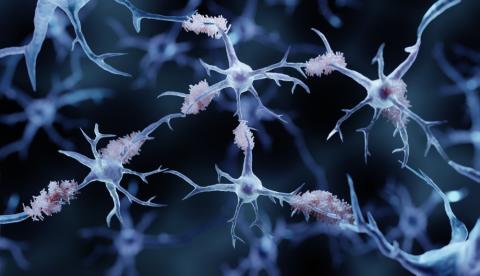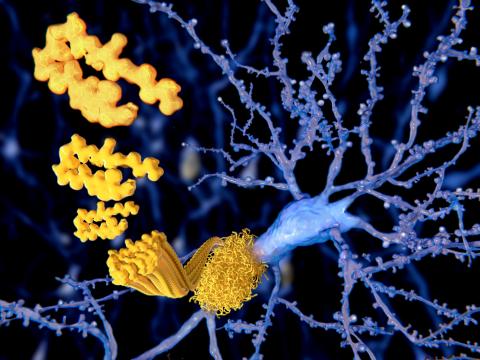A single copy of a protective gene variant helps delay early Alzheimer's disease
A family of more than 1,000 members with origins in Colombia has a mutation called "paisa" that leads to the development of Alzheimer's disease. In 2019, an added mutation in the apoE gene called "Christchurch" was described as conferring strong protection to an individual carrying two copies of it. Now, a study has found that 27 family members carry a single copy and that it is also associated with some degree of protection. According to the authors, who publish their findings in the journal NEJM, the discovery could be used to develop new treatments for the disease.

Eloy - NEJM (EN)
Eloy Rodríguez Rodríguez
Head of the Neurology Department at the Marqués de Valdecilla-IDIVAL University Hospital and Associate Professor of Medicine in the Department of Medicine and Psychiatry at the University of Cantabria
It is a quality and relevant study, conducted in a cohort of subjects unique in the world, such as those affected by the paisa mutation (mutation in the presenilin1-PSEN1 gene), which is very prevalent in the Antioquia region of Colombia and which gives rise to Alzheimer's disease with onset in the 40s.
Some time ago, they published a case of a subject with this mutation who was particularly resilient to developing the disease and who was associated with carrying two copies (homozygous) of the Christchurch variant of the ApoE gene. The current study seeks to describe the effect of carrying a single copy (heterozygous) of this ApoE variant in carriers of the mutation in the PSEN1 gene. The findings point to some protective effect (delayed age of onset, less tau pathology and somewhat less neurodegeneration) compared to non-carriers, although the effect is smaller than in the original homozygous case. This points to a gene dosage effect of the Christchurch variant (the more copies, the greater the protective effect).
The main limitation of the study is that the number of subjects with PSEN1 and carrying this variant is very low (only 27 subjects in the world's largest cohort of PSEN1 mutations, with 1000 subjects, which is a barbarity), so more studies are needed in other populations, both in carriers of mutations in PSEN1 (also different from paisa), and in carriers of other mutations in other genes (PSEN2, APP or APOE e4) and in populations with sporadic Alzheimer's, trying to find out whether this protective effect is maintained and its magnitude.
The most interesting thing - and the main door it leaves open - is that, if we are able to mimic the effect of this variant using drugs, it would open the door to treatments that may confer protection against the development of Alzheimer's disease.
Jordi Pérez-Tur - gen alzhéimer EN
Jordi Pérez-Tur
Research scientist at the Public Research Organisation (PRO) at the Institute of Biomedicine of Valencia of the Spanish National Research Council (CSIC)
Just a month ago a study of thousands of people was published showing that those with two copies of the E4 allele of the apolipoprotein E gene (APOE) had a form of Alzheimer's disease that behaved like another genetic form. These two copies led to poor brain function leading to dementia at ages not as advanced as in the general population.
Today we come across a study that analyses a single family of Colombian origin in which, in addition to a genetic variant causing AD in the Presenilin 1 gene (PSEN1), some individuals also have a very rare allele in the APOE gene called Christchurch (APOE3Ch). This work shows that, in this family, individuals with variants in PSEN1 and APOE3Ch have Alzheimer's disease that appears a few years later than in their relatives who only have the PSEN1 variant. This delay in the age of onset is also accompanied by fewer lesions in the brain, including vascular lesions, which were more abundant in carriers of the PSEN1 variant.
A few years ago, this same group observed how a member of this family carried two copies of this allele, APOE3Ch, and despite also having the PSEN1 variant that caused AD in his relatives at around 40 years of age, he showed no signs of dementia in his late 70s. That finding is now extended by the demonstration that a single copy of APOE3Ch may be moderately beneficial and joins another recent paper from another group showing that this variant may be beneficial in that astrocytes possessing it are more resistant to the spread of tau lesions than those without this variant.
Taken together, these findings have a very important aspect that was not so clear a short time ago: there are ways to slow the progression of Alzheimer's disease. Although the authors restrict the effect of this variant in APOE to the Colombian family, the evidence presented by other authors, for example, the work mentioned above, allows us to foresee that the moderate effect of the APOE3Ch variant may occur in the general population.
Deciphering the mechanisms that make a person moderately resistant to the progression of Alzheimer's disease may lead to the identification of new mechanisms that could lead to effective therapies. In fact, the fact that a single genetic variant possesses this ability may mean that slowing down the disease, although not simple, may be achievable.
Juan Fortea - gen alzhéimer EN
Juan Fortea
Director of the Memory Unit of the Neurology Service of the Hospital de la Santa Creu i Sant Pau and director of the Alzheimer's Unit at the Fundació Catalana Sindrome de Down
The study they present is very well designed and clearly justified, as it is a natural continuation of the group's previous studies that had demonstrated the gene's protective role in homozygosity. They now show that the APOE3 Christchurch allele in heterozygosity is also protective for the clinical manifestation of Alzheimer's disease. This study benefits from the world's largest cohort of PSEN1 mutation carriers, specifically the E280A mutation that causes autosomal dominant Alzheimer's disease (ADAD) with presenile onset (age of symptoms at 48 years). ADAD, despite its rarity, has been extensively studied because it offers unique opportunities for studying the pathophysiology of Alzheimer's disease, primarily due to its complete penetrance and predictable age of symptom onset. However, there is variability in the age of onset due to genetic and environmental factors. This study demonstrates that APOE3 Christchurch is a protective genetic factor.
The study complements previous studies of a homozygous APOE3 Christchurch allele carrier group in which the age of symptom onset was more than 20 years later. They now show a more modest protective role of the allele in heterozygosity, suggesting a dose-response of the protective factor. Coming also from a well-studied cohort, the study shows that this mutation affects tau accumulation and delays symptoms rather than affecting amyloid accumulation which is still occurring, suggesting a later effect within the amyloid cascade.
A limitation of the study is the relatively small size of the APOE3 Christchurch carriers who also come from the same extended family (a founder effect that justifies a relatively large number of carriers in a particular geographical area). This means that studies in more diverse populations, and possibly in other populations such as Down's syndrome, are needed to validate the magnitude of the protective effect conferred by this variant. Furthermore, this study, despite the relevance of the biomarker data mentioned above, does not provide data on the biological mechanisms conferring protection. This is essential for the future development of protective therapies based on these findings.
"I have no conflicts of interest to declare with respect to this particular study, although I have been a consultant for several companies developing anti-amyloid therapies".
Quiroz et al.
- Research article
- Peer reviewed
- Observational study
- People



